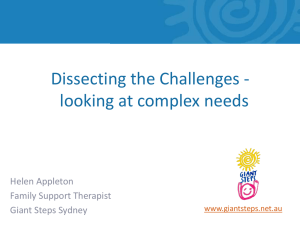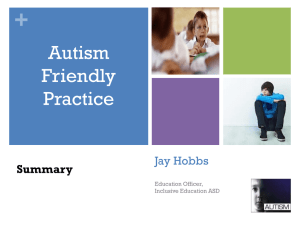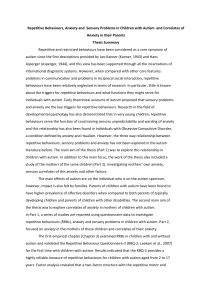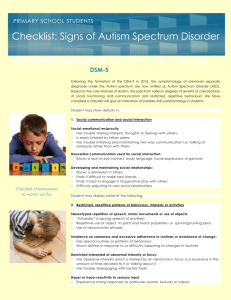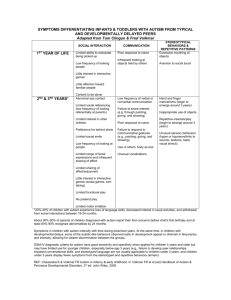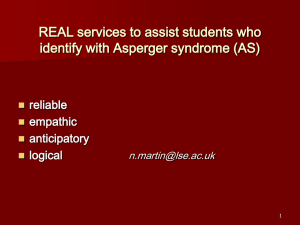Baily Thomas Charitable Fund
advertisement
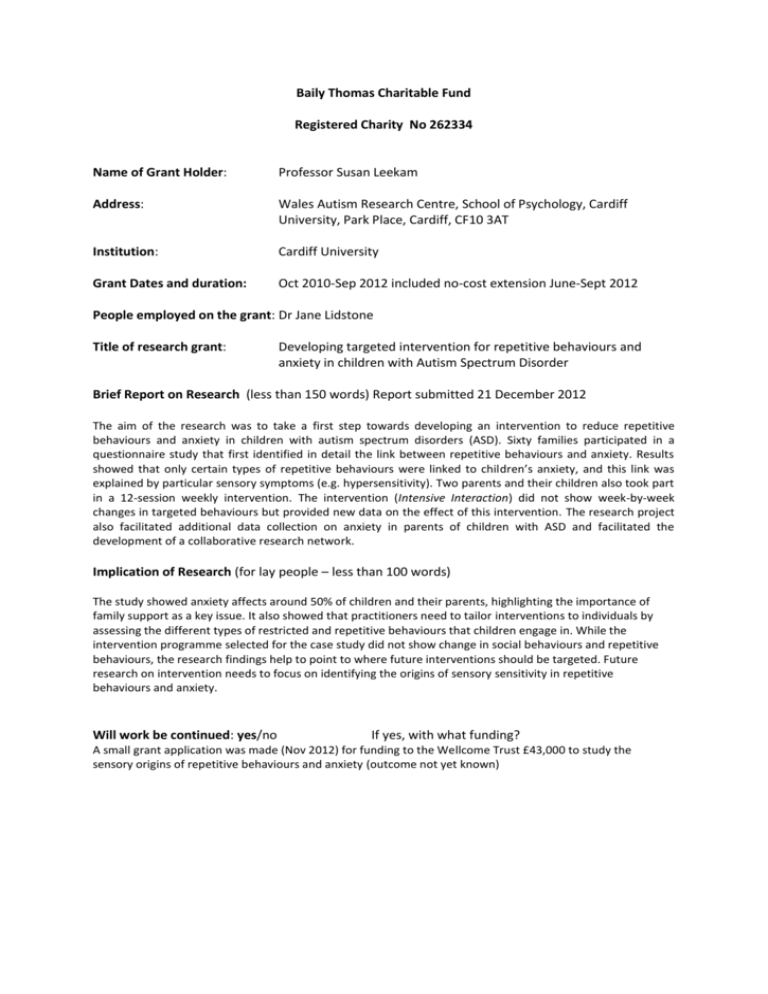
Baily Thomas Charitable Fund Registered Charity No 262334 Name of Grant Holder: Professor Susan Leekam Address: Wales Autism Research Centre, School of Psychology, Cardiff University, Park Place, Cardiff, CF10 3AT Institution: Cardiff University Grant Dates and duration: Oct 2010-Sep 2012 included no-cost extension June-Sept 2012 People employed on the grant: Dr Jane Lidstone Title of research grant: Developing targeted intervention for repetitive behaviours and anxiety in children with Autism Spectrum Disorder Brief Report on Research (less than 150 words) Report submitted 21 December 2012 The aim of the research was to take a first step towards developing an intervention to reduce repetitive behaviours and anxiety in children with autism spectrum disorders (ASD). Sixty families participated in a questionnaire study that first identified in detail the link between repetitive behaviours and anxiety. Results showed that only certain types of repetitive behaviours were linked to children’s anxiety, and this link was explained by particular sensory symptoms (e.g. hypersensitivity). Two parents and their children also took part in a 12-session weekly intervention. The intervention (Intensive Interaction) did not show week-by-week changes in targeted behaviours but provided new data on the effect of this intervention. The research project also facilitated additional data collection on anxiety in parents of children with ASD and facilitated the development of a collaborative research network. Implication of Research (for lay people – less than 100 words) The study showed anxiety affects around 50% of children and their parents, highlighting the importance of family support as a key issue. It also showed that practitioners need to tailor interventions to individuals by assessing the different types of restricted and repetitive behaviours that children engage in. While the intervention programme selected for the case study did not show change in social behaviours and repetitive behaviours, the research findings help to point to where future interventions should be targeted. Future research on intervention needs to focus on identifying the origins of sensory sensitivity in repetitive behaviours and anxiety. Will work be continued: yes/no If yes, with what funding? A small grant application was made (Nov 2012) for funding to the Wellcome Trust £43,000 to study the sensory origins of repetitive behaviours and anxiety (outcome not yet known) Full report (less than 1,000 words), references and outputs This research aimed to take a first step towards developing suitable interventions to help reduce repetitive behaviour and anxiety in children with autism spectrum disorders. Two studies were carried out. Study 1 identified in detail the link between repetitive behaviour and anxiety. This study was needed because there has been very little research on repetitive behaviours and how they are they linked to anxiety. Therefore the study assessed the extent to which children with higher levels of anxiety also have higher levels of repetitive behaviour and what factors help to explain this link. Study 2 carried out an intervention study to measure change in behaviours during an intervention. The results of both studies and a summary of research outputs are shown below. In Study 1, sixty parents of children with ASD aged 2-17 years completed questionnaires about their children’s development. With respect to repetitive behaviours, parents reported that that the most common function of their children’s repetitive motor behaviours was to control sensory feedback 1. We also found that anxiety was very common with 46% children meeting criteria for clinical levels of anxiety 2. Further analysis enabled us to explore the relation between anxiety and repetitive behaviour. The results showed an interesting and distinctive pattern. Higher levels of anxiety were related to higher frequencies of repetitive behaviours. However, this link was found for only one type of repetitive behaviour; the insistence on sameness type of repetitive behaviour, such as routines, rituals and special preoccupations, was associated with anxiety. In contrast, anxiety was not related to repetitive motor behaviours (such as hand flapping, rocking etc)2. Having found a distinctive relation between anxiety and insistence on sameness behaviours, we then studied the role of sensory symptoms in this relation. We looked at different types of sensory symptoms, and found that those described as sensory hypersensitivity symptoms (e.g. sensory sensitivity and sensory avoidance) were the important sensory factors explaining the relation between anxiety and insistence on sameness 2. In contrast, the seeking out of sensory stimulation (linked to hyposensitivity) was less important. Although sensory seeking was strongly associated with repetitive behaviours, it was not related to anxiety. These results help to indicate a pathway for the development of insistence on sameness behaviours and anxiety in ASD in which hypersensitivity may play an important role. Repetitive motor behaviours on the other hand might function in a different way to regulate sensory feedback without the same implications for anxiety. The results have been prepared for publication (paper attached2). The results will help to guide practitioners to be more aware of levels of anxiety in children and to assess their individual profile of repetitive behaviours and sensory symptoms in order to tailor interventions for behaviour and anxiety to each individual. As the data collection for Study 1 extended through the grant period, it was not possible to build these new findings into the design of Study 2, which was carried out at the same time. Therefore in making the first step towards the development of a future intervention, we focused on an existing intervention called Intensive Interaction. Intensive Interaction is an imitation-based intervention method used by the NHS in Wales that involves matching the child’s behaviours, emotional expressions and body postures to create engagement in social interaction. For Study 2 we worked closely with four clinicians to design the 12-week intervention. The intervention comprised a multiple-baseline single case research design. Two 3-year-old children took part. The weekly intervention session was carried out in a university laboratory by speech and language therapist, Hilary Kanaris. The session was preceded by a play session with a researcher. There were 8 baseline sessions and two follow-up sessions. All 22 sessions were blind coded using the system, INTERACT. New coding schemes were designed and used to measure both social attention and repetitive behaviour. The repetitive behaviour measure did not yield inter-rater reliability at a high enough level and further development of the coding system is required. The social attention measure did yield high inter-rater reliability and reports are based on these findings. Results showed that Intensive Interaction did not lead to week-by-week changes in targeted behaviours. Social attention did not increase over the course of the intervention phase for either child, nor during free play with the researcher. There was no evidence of (a) cumulative effects of imitation, or (b) generalisation to free play 3. Given that the claims for this intervention are strong and given that social attention has been proposed as a key early indicator of efficacy in autism clinical trials, it is important to publish these findings and a paper has been submitted for publication3. The Baily Thomas project provided the catalyst for additional research and networking activities beyond the project which added value to the project. First, PhD student Mirko Uljaravic, funded by a Welsh Government PhD grant, worked with us throughout the project, developing data for Study 1 and contributing to Study 2. As a result of his work, we have been able to collect additional new data not only on children’s behaviour (as described above) but also on their parents’ own stress and well-being. His results4, 5 show that parents are as vulnerable to anxiety as their children (48% with significant levels of anxiety). Further analysis showed that parents’ anxiety is not simply a direct effect of their child’s behaviours, anxiety, or autism level but is very linked to psychological factors (intolerance of uncertainty) within the parent. This is an important finding as it highlights the need for family support of both children and their parents. It also has implications for future research on genetic-environment interactions. Other added value from the Baily Thomas project included the building of a collaboration network, including bi-monthly meetings with four clinicians (South Wales) and visits and discussion from collaborators at Melbourne University, Australia and Bucknell College, USA and four researchers from Newcastle University. The project has enabled data sharing with Cambridge University which added a factor analysis element to our study of repetitive behaviours. A number of students have been mentored thanks to this project. Jane Lidstone gained an award for a summer student who worked with us on coding in 2012 and we mentored and supported an Italian postgraduate intern, an Educational Psychology student and three undergraduate students. Through the consolidation of our collaborative network, we are now the largest group internationally working in this research topic. Publications and presentations (see attached): Research presentations Repetitive behaviour workshop. Cardiff University 24/09/10. Presentations by collaborators; Prof Margot Prior (Australia), Prof Mark Freeston, Prof Helen McConachie, Prof Ann Le Couteur (all Newcastle University) Lidstone J., Uljarevic M., Leekam S.R., Kanaris H, McKigney A-M, Mullis J, & Paradice R (2012). How do the functions of restricted and repetitive behaviours vary with developmental level in children with autism spectrum disorders? Poster presented at the International Meeting for Autism Research, Toronto, Canada, May 2012. Uljarevic, M., Lidstone, J., Leekam, S. R., Kanaris, H., McKigney, A. M., Mullis, J., Paradice, R. Anxiety in Children with Autism Spectrum Disorders is Associated with Affective Symptoms in Their Mothers. Poster presented at the International Meeting for Autism Research (IMFAR), May 17th-19th, Toronto. Uljarevic, M. Anxiety, Repetitive Behaviours and Sensory Problems in children with ASD. Talk given to the School of Psychology, Cardiff University, June 2012. Uljarevic, M., Lidstone, J., Leekam, S., Freeston, M., Le Couteur, A., McConachie, H., Rodgers, J., & Prior, M. Sensory processing and repetitive motor behaviours in children with Autism Spectrum Disorders (ASD). Poster presented at the British Psychological Society Developmental Section Annual Conference, 5th7th September 2012, University of Strathclyde, Glasgow. Uljarevic, M., Lidstone, J., Leekam, S. R. Sensory symptoms and anxiety: A study of children with ASD and their parents. Talk given to the Bristol Autism Research Group (BARG), 18 th September 2012, School of Experimental Psychology, Bristol. Uljarevic, M: Repetitive behaviours and anxiety in children with autism spectrum disorders. Poster presented at Learning Disability and Autism Network Conference, 16th March 2011 Research publications 2 Lidstone, J., Uljarevic, M., Sullivan, J., Rodgers, J., McConachie, H., Freeston, M., Prior, M., & Leekam, S. Relations among restricted and repetitive behaviours, anxiety and sensory symptoms in individuals with autism spectrum disorders. Paper to be submitted to Research in Autism Spectrum Disorders. 3 Lidstone, Uljarevic, M., Dankova, L., Kanaris, H., Mullis, J., McKigney, A-M., Paradice, R. & Leekam, S. Early intervention for children with autism: Adult imitation of children’s actions. Paper submitted to Journal of Autism and Developmental Disorders (submitted) 4 Uljarevic, M. Repetitive behaviours, anxiety and sensory problems in children with autism and correlates of anxiety in their parents. Unpublished PhD thesis, Cardiff University, to be submitted 2013 Presentations for parents and professionals Lidstone, J. Research on intervention. Presentation to Gwenda Thomas DM. Welsh Government. Jan 17 th 2011 Uljarevic, M., Identifying the risk factors linked to anxiety in autism spectrum disorders. Presentation to Gwenda Thomas DM. Welsh Government. Jan 17th 2011 Uljarevic, M., Lidstone, J., Leekam, S. R. Anxiety and stress in parents of children with autism. Talk given at the dissemination event for parents who took part in the study, Cardiff and Vale Parent Dissemination Event September 17th, 2012, School of Biosciences, Cardiff University Uljarevic, M., Repetitive Behaviours, Sensory Issues and Anxiety in ASD. Talk given to parents of children at Ashgrove School, 18/05/2011. Repetitive Behaviours in Children with Autism. Torfaen Autism Fair 08/12/2010 Publications for parents and professionals Newsletter 1: New projects: The Children’s and Parents’ Behaviour Study. Summer 2011 5 Newsletter 2: Children’s & Parents’ Behaviour Study, Dec. 2012 Signed: Date:
